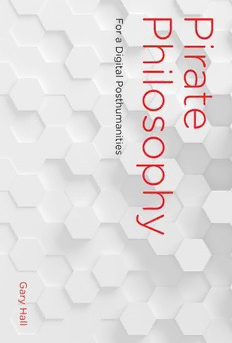
Pirate Philosophy: For a Digital Posthumanities PDF
Preview Pirate Philosophy: For a Digital Posthumanities
Pirate Philosophy Leonardo Roger F. Malina, Executive Editor Sean Cubitt, Editor-in-Chief Closer: Performance, Technologies, Phenomenology , Susan Kozel, 2007 Video: The Reflexive Medium , Yvonne Spielmann, 2007 Software Studies: A Lexicon , Matthew Fuller, 2008 Tactical Biopolitics: Art, Activism, and Technoscience , edited by Beatriz da Costa and Kavita Philip, 2008 White Heat and Cold Logic: British Computer Art 1960–1980 , edited by Paul Brown, Charlie Gere, Nicholas Lambert, and Catherine Mason, 2008 Rethinking Curating: Art after New Media , Beryl Graham and Sarah Cook, 2010 Green Light: Toward an Art of Evolution , George Gessert, 2010 Enfoldment and Infinity: An Islamic Genealogy of New Media Art , Laura U. Marks, 2010 Synthetics: Aspects of Art & Technology in Australia, 1956–1975 , Stephen Jones, 2011 Hybrid Cultures: Japanese Media Arts in Dialogue with the West , Yvonne Spielmann, 2012 Walking and Mapping: Artists as Cartographers , Karen O’Rourke, 2013 The Fourth Dimension and Non-Euclidean Geometry in Modern Art, revised edition , Linda Dalrymple Henderson, 2013 Illusions in Motion: Media Archaeology of the Moving Panorama and Related Spectacles , Erkki Huhtamo, 2013 Relive: Media Art Histories , edited by Sean Cubitt and Paul Thomas, 2013 Re-collection: Art, New Media, and Social Memory , Richard Rinehart and Jon Ippolito, 2014 Biopolitical Screens: Image, Power, and the Neoliberal Brain , Pasi Väliaho, 2014 The Practice of Light: A Genealogy of Visual Technologies from Prints to Pixels , Sean Cubitt, 2014 The Tone of Our Times: Sound, Sense, Economy, and Ecology , Frances Dyson, 2014 The Experience Machine: Stan VanDerBeek’s Movie-Drome and Expanded Cinema , Gloria Sutton, 2014 Hanan al-Cinema: Affections for the Moving Image , Laura U. Marks, 2015 Writing and Unwriting (Media) Art History: Erkki Kurenniemi in 2048 , edited by Joasia Krysa and Jussi Parikka, 2015 Control: Digitality as Cultural Logic , Seb Franklin, 2015 New Tendencies: Art at the Threshold of the Information Revolution (1961–1978) , Armin Medosch, 2016 Screen Ecologies: Art, Media, and the Environment in the Asia-Pacific Region , Larissa Hjorth, Sarah Pink, Kristen Sharp, and Linda Williams, 2016 Pirate Philosophy: For a Digital Posthumanities , Gary Hall, 2016 See http://mitpress.mit.edu for a complete list of titles in this series. Pirate Philosophy For a Digital Posthumanties Gary Hall The MIT Press Cambridge, Massachusetts London, England © 2016 Massachusetts Institute of Technology All rights reserved. No part of this book may be reproduced in any form by any electronic or mechanical means (including photocopying, recording, or information storage and retrieval) without permission in writing from the publisher. This book was set in Stone Sans and Stone Serif by Toppan Best-set Premedia Limited. Printed and bound in the United States of America. Library of Congress Cataloging-in-Publication Data Names: Hall, Gary, 1962– author. Title: Pirate philosophy for a digital posthumanities / Gary Hall. Description: Cambridge, MA: The MIT Press, 2016. | Series: Leonardo book series | Includes bibliographical references and index. Identifi ers: LCCN 2015039700 | ISBN 9780262034401 (hardcover : alk. paper) Subjects: LCSH: Humanities—Technological innovations. | Humanities—Research. | Communication in learning and scholarship—Technological innovations. | Scholarly publishing—Technological innovations. | Open access publishing. Classifi cation: LCC AZ195 .H35 2016 | DDC 001.3—dc23 LC record available at http://lccn.loc.gov/2015039700 10 9 8 7 6 5 4 3 2 1 This one is for Mark Poster Contents Series Foreword ix Acknowledgments xi Preface xiii 1 THE COMMONS AND COMMUNITY 1 How We Remain Modern 2 THE HUMANITIES 25 There Are No Digital Humanities 3 THE HUMAN 57 #MySubjectivation 4 THE POSTHUMAN 85 What Are the Digital Posthumanities? 5 COPYRIGHT AND PIRACY 127 Pirate Radical Philosophy 6 THE FUTURE OF THE BOOK 145 The Unbound Book Notes 161 Index 243 Series Foreword Leonardo/International Society for the Arts, Sciences, and Technology (ISAST) Leonardo, the International Society for the Arts, Sciences, and Technology, and the affiliated French organization Association Leonardo have some very simple goals: 1. To advocate, document, and make known the work of artists, research- ers, and scholars developing the new ways that the contemporary arts inter- act with science, technology, and society. 2. To create a forum and meeting places where artists, scientists, and engi- neers can meet, exchange ideas, and, when appropriate, collaborate. 3. To contribute, through the interaction of the arts and sciences, to the creation of the new culture that will be needed to transition to a sustainable planetary society. When the journal Leonardo was started some forty-five years ago, these creative disciplines existed in segregated institutional and social networks, a situation dramatized at that time by the “two cultures” debates initiated by C. P. Snow. Today we live in a different time of cross-disciplinary fer- ment, collaboration, and intellectual confrontation enabled by new hybrid organizations, new funding sponsors, and the shared tools of computers and the Internet. Above all, new generations of artist-researchers and researcher-artists are now at work individually and collaboratively bridging the art, science, and technology disciplines. For some of the hard problems in our society, we have no choice but to find new ways to couple the arts and sciences. Perhaps in our lifetime we will see the emergence of “new Leonardos,” hybrid creative individuals or teams that will not only develop a meaningful art for our times but also drive new agendas in science and stimulate technological innovation that addresses today’s human needs.
